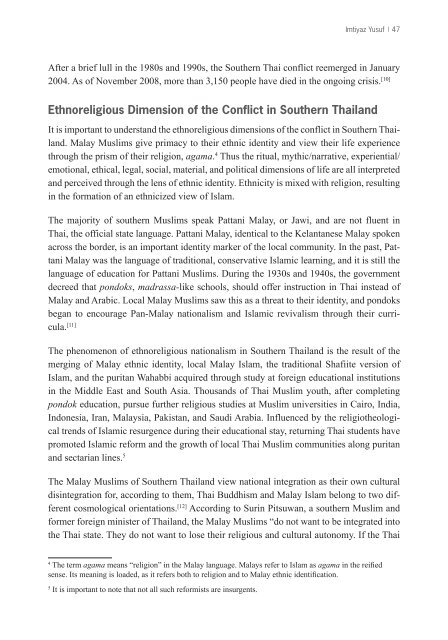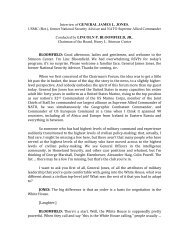Islam and Politics - The Stimson Center
Islam and Politics - The Stimson Center
Islam and Politics - The Stimson Center
Create successful ePaper yourself
Turn your PDF publications into a flip-book with our unique Google optimized e-Paper software.
Imtiyaz Yusuf | 47<br />
After a brief lull in the 1980s <strong>and</strong> 1990s, the Southern Thai conflict reemerged in January<br />
2004. As of November 2008, more than 3,150 people have died in the ongoing crisis. [10]<br />
Ethnoreligious Dimension of the Conflict in Southern Thail<strong>and</strong><br />
It is important to underst<strong>and</strong> the ethnoreligious dimensions of the conflict in Southern Thail<strong>and</strong>.<br />
Malay Muslims give primacy to their ethnic identity <strong>and</strong> view their life experience<br />
through the prism of their religion, agama. 4 Thus the ritual, mythic/narrative, experiential/<br />
emotional, ethical, legal, social, material, <strong>and</strong> political dimensions of life are all interpreted<br />
<strong>and</strong> perceived through the lens of ethnic identity. Ethnicity is mixed with religion, resulting<br />
in the formation of an ethnicized view of <strong>Islam</strong>.<br />
<strong>The</strong> majority of southern Muslims speak Pattani Malay, or Jawi, <strong>and</strong> are not fluent in<br />
Thai, the official state language. Pattani Malay, identical to the Kelantanese Malay spoken<br />
across the border, is an important identity marker of the local community. In the past, Pattani<br />
Malay was the language of traditional, conservative <strong>Islam</strong>ic learning, <strong>and</strong> it is still the<br />
language of education for Pattani Muslims. During the 1930s <strong>and</strong> 1940s, the government<br />
decreed that pondoks, madrassa-like schools, should offer instruction in Thai instead of<br />
Malay <strong>and</strong> Arabic. Local Malay Muslims saw this as a threat to their identity, <strong>and</strong> pondoks<br />
began to encourage Pan-Malay nationalism <strong>and</strong> <strong>Islam</strong>ic revivalism through their curricula.<br />
[11]<br />
<strong>The</strong> phenomenon of ethnoreligious nationalism in Southern Thail<strong>and</strong> is the result of the<br />
merging of Malay ethnic identity, local Malay <strong>Islam</strong>, the traditional Shafiite version of<br />
<strong>Islam</strong>, <strong>and</strong> the puritan Wahabbi acquired through study at foreign educational institutions<br />
in the Middle East <strong>and</strong> South Asia. Thous<strong>and</strong>s of Thai Muslim youth, after completing<br />
pondok education, pursue further religious studies at Muslim universities in Cairo, India,<br />
Indonesia, Iran, Malaysia, Pakistan, <strong>and</strong> Saudi Arabia. Influenced by the religiotheological<br />
trends of <strong>Islam</strong>ic resurgence during their educational stay, returning Thai students have<br />
promoted <strong>Islam</strong>ic reform <strong>and</strong> the growth of local Thai Muslim communities along puritan<br />
<strong>and</strong> sectarian lines. 5<br />
<strong>The</strong> Malay Muslims of Southern Thail<strong>and</strong> view national integration as their own cultural<br />
disintegration for, according to them, Thai Buddhism <strong>and</strong> Malay <strong>Islam</strong> belong to two different<br />
cosmological orientations. [12] According to Surin Pitsuwan, a southern Muslim <strong>and</strong><br />
former foreign minister of Thail<strong>and</strong>, the Malay Muslims “do not want to be integrated into<br />
the Thai state. <strong>The</strong>y do not want to lose their religious <strong>and</strong> cultural autonomy. If the Thai<br />
4<br />
<strong>The</strong> term agama means “religion” in the Malay language. Malays refer to <strong>Islam</strong> as agama in the reified<br />
sense. Its meaning is loaded, as it refers both to religion <strong>and</strong> to Malay ethnic identification.<br />
5<br />
It is important to note that not all such reformists are insurgents.

















